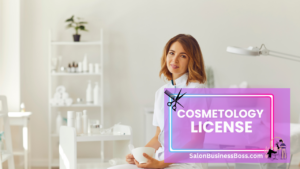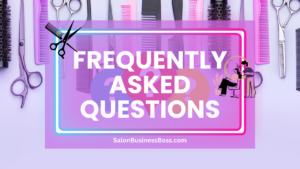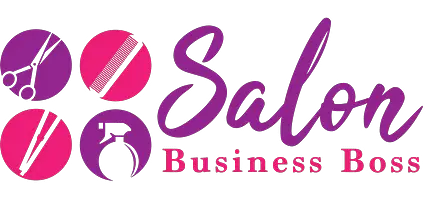Opening a salon can be an exciting venture, allowing you to express your creativity while providing essential beauty and grooming services to clients. However, before embarking on this journey, it’s crucial to understand the licensing requirements involved. In this article, we will delve into the various licenses you need to acquire to open a salon, exploring the different aspects of each license.
Licenses you need to open a salon are: a general business license, a salon operation license, cosmetology licenses for you and your staff, seller’s permit for product sales, fire and safety permits, music and entertainment licenses for background music, and signage permits for advertisements. Complying with these requirements ensures a safe and legally compliant salon operation.
1. Business License
A general business license serves as the cornerstone for starting any entrepreneurial endeavor, including opening a salon. This license is a critical legal requirement in most jurisdictions and acts as official permission to conduct business within a particular area. Acquiring a business license involves a straightforward yet essential process that demands compliance with local regulations and policies.
To secure a business license for your salon, you must begin by registering your establishment with the appropriate local government authorities. This step helps ensure that your salon operates within the bounds of the law and contributes to the local economy. During the registration process, you may be required to provide detailed information about the type of services your salon will offer, its intended scope, and the physical location of your establishment.
Obtaining a business license involves the payment of necessary fees, which can vary depending on the region and the size of your salon. These fees help fund essential administrative tasks and ensure proper oversight by the local authorities.
By obtaining a business license, you demonstrate your commitment to adhering to legal requirements and responsible business practices. This foundational step sets the stage for a legitimate and reputable salon operation, building trust with both potential customers and regulatory bodies.
2. Salon Operation License
Certain regions may mandate a specific salon operation license to ensure compliance with health, safety, and sanitation regulations. This specialized license serves as a means of protecting the well-being of salon clients and staff, as well as maintaining the industry’s standards.
To acquire a salon operation license, salon owners must demonstrate their commitment to maintaining a safe and hygienic environment. This often involves providing evidence of adherence to strict sanitation practices, ensuring the presence of safety equipment, and compliance with zoning regulations.
Salon owners must implement robust safety measures to mitigate potential hazards associated with various beauty treatments and equipment. Proper sanitation practices and the use of disposable or sanitized tools are essential in safeguarding clients from infections and skin-related issues.
The salon operation license also addresses zoning regulations, ensuring that your establishment operates in areas designated for commercial or service-related businesses. Complying with zoning rules prevents legal complications and maintains harmony with neighboring businesses and residential areas.
Securing a salon operation license signifies your commitment to providing safe and reliable services, giving your salon a competitive edge and fostering trust with customers. By prioritizing the well-being of clients and staff, you create an environment where beauty and comfort flourish, attracting a loyal and satisfied clientele.
3. Cosmetology License

The cosmetology license is a pivotal requirement for both salon owners and their employees, as it establishes the essential qualifications necessary to offer a wide range of beauty services. Obtaining a cosmetology license involves specialized training and examination from accredited cosmetology schools or institutions recognized by the licensing board.
Cosmetology training programs encompass a comprehensive curriculum that covers various aspects of beauty and grooming, including hair styling, cutting, coloring, skin care, nail treatments, and esthetic procedures. These programs aim to equip aspiring cosmetologists with the knowledge, skills, and techniques required to perform their tasks proficiently and safely.
Upon completing the training, candidates must pass a rigorous examination to demonstrate their competency and understanding of the field. Successful candidates are granted the cosmetology license, affirming their qualification to provide professional beauty services.
For salon owners, ensuring that all employees hold valid cosmetology licenses is crucial to upholding the quality and reputation of the establishment. Employing licensed cosmetologists inspires confidence in customers, reassuring them that they are receiving services from trained and certified professionals.
Cosmetology licenses also play a role in maintaining industry standards, promoting safety, and safeguarding the well-being of salon clients. As the beauty industry continues to evolve, the cosmetology license remains a vital instrument in raising the bar of excellence within the profession.
Read more about: Can You Open a Salon Without a Cosmetology License?
4. Salon Shop License
In specific regions, a salon shop license may be a separate requirement from individual cosmetology licenses. Rather than focusing on the qualifications of practitioners, the salon shop license concentrates on regulating the salon establishment itself.
The salon shop license involves inspection and compliance verification of the salon’s physical space, safety measures, and sanitation standards. Authorities conduct inspections to ensure that the salon meets the necessary safety and hygiene requirements, guaranteeing a secure and hygienic environment for both clients and staff.
Physical space requirements may include proper ventilation, adequate lighting, and appropriate spacing of salon stations to ensure a comfortable and efficient working environment. Safety measures encompass fire safety protocols, emergency exits, and the presence of fire extinguishers.
Sanitation standards are of utmost importance in a salon setting to prevent the spread of infections and maintain hygiene. Compliance with sanitation practices includes regular cleaning and disinfection of tools, equipment, and workstations, as well as proper disposal of waste materials.
By obtaining a salon shop license, salon owners demonstrate their commitment to providing a safe, clean, and organized salon environment. This not only ensures compliance with local regulations but also enhances the overall client experience, fostering a loyal and satisfied customer base.
5. Seller’s Permit
As a salon owner, offering beauty products and merchandise to your clients can be an excellent way to boost your revenue and enhance the overall customer experience. However, to conduct these sales legally, obtaining a seller’s permit or sales tax permit is imperative. This permit allows you to collect and remit the appropriate sales tax on the products you sell within your salon.
The process of obtaining a seller’s permit may vary depending on your jurisdiction. Typically, you will need to apply for the permit through your local taxation department or revenue agency. The application process may involve providing essential business details, such as your salon’s name, address, and business structure.
Once you receive your seller’s permit, you become responsible for collecting the applicable sales tax on all taxable sales made in your salon. This tax is then remitted to the appropriate taxing authority at regular intervals, as specified by the local regulations.
Maintaining compliance with sales tax regulations not only ensures that your salon operates legally but also helps avoid potential fines and penalties for non-compliance. It is essential to keep accurate records of your sales and tax collections to facilitate smooth tax reporting and auditing processes.
By obtaining a seller’s permit and diligently fulfilling your tax obligations, you can confidently offer beauty products in your salon, knowing that you are conducting your business ethically and responsibly.
6. Fire and Safety Permits
The safety and well-being of your salon clients and staff are paramount. To ensure a secure environment, fire and safety permits are crucial for any business, including salons. These permits verify that your salon complies with fire safety standards and implements appropriate fire prevention measures.
As part of the process, your salon may undergo inspections to evaluate its layout and adherence to fire safety protocols. Inspectors will look for proper emergency exits, clear evacuation routes, and adequate fire extinguishers at strategic locations throughout the establishment.
Additionally, the inspection may include an assessment of electrical wiring, heating and cooling systems, and other potential fire hazards. Ensuring that your salon is well-equipped to handle emergencies can significantly reduce the risk of fire-related incidents and promote a safer environment for everyone.
Fire and safety permits not only protect your clients and staff but also demonstrate your commitment to maintaining a secure and responsible business. Complying with these regulations can foster trust with your clientele and contribute to a positive reputation within the community.
Regularly reviewing and updating fire safety measures is essential to meet changing safety standards and keep your salon in line with current regulations. By prioritizing fire safety, you create an environment where both customers and employees feel safe and secure, leading to a thriving and successful salon business.
7. Music and Entertainment Licenses

Adding background music or offering entertainment in your salon can enhance the ambiance and create a more enjoyable experience for your clients. However, playing music publicly without the necessary licenses can lead to legal issues. Music and entertainment licenses ensure that artists and creators receive fair compensation for the use of their work.
Depending on your jurisdiction, you may need to secure licenses from performing rights organizations such as ASCAP (American Society of Composers, Authors, and Publishers), BMI (Broadcast Music, Inc.), or SESAC (Society of European Stage Authors and Composers). These organizations represent songwriters, composers, and music publishers and collect royalties on their behalf when their music is played in public spaces like salons.
Obtaining music and entertainment licenses is usually straightforward. You can apply directly through the respective organizations or work with licensing agencies that offer comprehensive packages for businesses like yours.
Complying with music licensing regulations not only ensures legal protection but also supports artists and the music industry. It demonstrates your commitment to ethical business practices and fosters positive relationships with artists and their representatives.
By acquiring the necessary licenses and paying appropriate royalties, you can create a harmonious and inviting atmosphere in your salon, providing clients with a memorable and pleasant experience.
Read more about: Opening a Salon: Elevate Beauty and Pampering
8. Signage Permits
Effective signage is a vital aspect of marketing and promoting your salon to potential clients. However, before displaying any signs or advertising materials, you may need to obtain a signage permit.
Signage regulations vary by location and may encompass rules on the size, location, and content of the signs. These regulations are in place to ensure public safety, prevent visual clutter, and maintain the overall aesthetics of the area.
Before putting up any signage, it is crucial to familiarize yourself with local signage regulations and obtain the necessary permits. This process may involve submitting sign designs for approval and paying applicable fees.
By adhering to signage regulations and obtaining the required permits, you avoid potential fines and legal issues. Additionally, displaying signage that complies with local rules contributes to the overall attractiveness of your salon and helps attract more foot traffic.
Well-designed and properly placed signs can effectively convey your salon’s brand and services, enticing potential clients to step inside. Striking the right balance between eye-catching signage and adherence to local regulations can significantly contribute to the success of your salon business.
Conclusion
Opening a salon requires careful consideration and adherence to a variety of licensing requirements. From general business licenses to specific cosmetology permits, each license serves a critical purpose in ensuring the safety, compliance, and success of your salon. By understanding and fulfilling these licensing obligations, you can lay a solid foundation for a thriving salon business that serves the needs of your clients while maintaining legal and ethical standards. Remember to stay updated on any changes in regulations and seek professional guidance if needed to navigate the licensing process smoothly. With dedication and a passion for beauty and grooming services, your salon can become a valued asset in your community.
Frequently Asked Questions

1. Are licenses different in various regions?
Yes, licensing requirements may vary based on the local government regulations and laws.
2.Can I apply for all licenses at once?
While some licenses can be obtained simultaneously, others may require separate application processes.
3. What happens if I operate without the necessary licenses?
Operating without proper licenses can result in fines, legal consequences, and closure of your salon. It’s essential to comply with licensing regulations to run a legitimate and successful business.
To learn more on how to start you own salon checkout my startup documents here.
Please note that the contents of this blog are for informational and entertainment purposes only and should not be construed as legal advice. Any action taken based on the information provided in this blog is solely at your own risk. Additionally, all images used in this blog are generated under the CC0 license of Creative Commons, which means they are free to use for any purpose without attribution.

About the author. Entrepreneur and Salon Business Fan.
Hi! I am Shawn and I am a happy individual who happens to be an entrepreneur. I have owned several types of businesses in my life from a coffee shop to an import and export business to an online review business plus a few more and now I create online salon business resources for those interested in starting new ventures. It’s demanding work but I love it. I do it for those passionate about their business and their goals. That’s why when I meet a salon business owner, I see myself. I know how hard the struggle is to retain clients, find good employees and keep the business growing all while trying to stay competitive.
That’s why I created Salon Business Boss: I want to help salon business owners like you build a thriving business that brings you endless joy and supports your ideal lifestyle.

